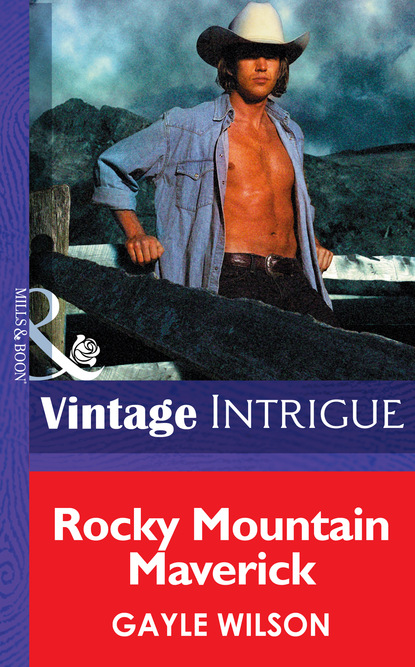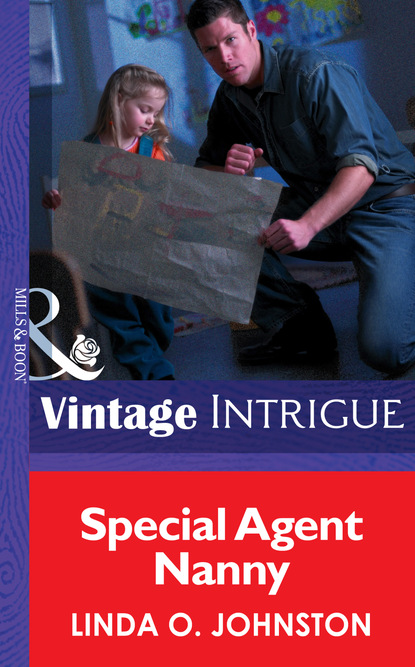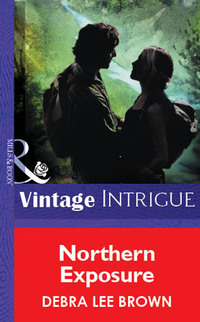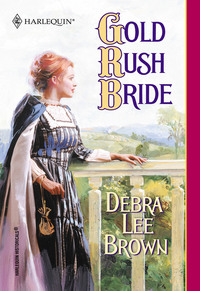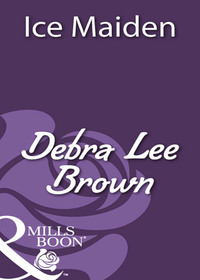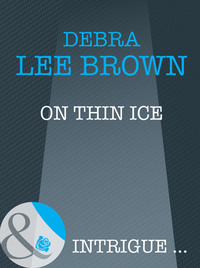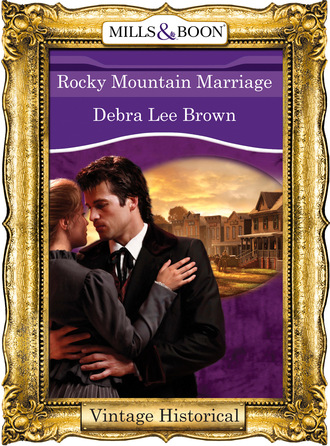
Полная версия
Rocky Mountain Marriage

“You’re right not to trust me.”
He paused, as if some terrible struggle were going on in his mind.
She was aware of her beating heart, of the room growing warmer. He grazed her palm with his thumb, tenderly, with affection, and the sensation of it sent a shiver clear up her spine.
Then without warning, as if he’d been dreaming and had all of a sudden come awake, he laughed. His face lit up, his eyes flashed mischief. She tried to draw her hand away as the man withdrew and the rogue appeared.
His fingers tightened over hers. “I’ve been known to lead women astray.” To punctuate the point, he arched one dark brow in a scandalously suggestive manner.
Dora pulled herself together. “Yes, well…” She yanked, and her hand was freed. She shook it to revive her circulation. “This woman is miraculously unaffected!”
Praise for Debra Lee Brown’s previous titles
Gold Rush Bride
“Debra Lee Brown’s traditional romance captures the era’s excitement and excess in lively characters meant for each other.”
—Romantic Times
Ice Maiden
“Ice Maiden is an enticing tale that will warm your heart.”
—Romantic Times
“This Viking tale of high adventure gallops through time and into the hearts of the reader.”
—Rendezvous
The Virgin Spring
“Debra Lee Brown makes her mark with The Virgin Spring, which should be read by all lovers of Scottish romances.”
—Affaire de Coeur
“A remarkable story. The fast pace, filled with treachery, mystery, and passion, left me breathless.”
—Rendezvous
Rocky Mountain Marriage
Debra Lee Brown

www.millsandboon.co.uk
MILLS & BOON
Before you start reading, why not sign up?
Thank you for downloading this Mills & Boon book. If you want to hear about exclusive discounts, special offers and competitions, sign up to our email newsletter today!
SIGN ME UP!
Or simply visit
signup.millsandboon.co.uk
Mills & Boon emails are completely free to receive and you can unsubscribe at any time via the link in any email we send you.
For Dad, Dorothy and Uncle Dickie
Contents
Chapter One
Chapter Two
Chapter Three
Chapter Four
Chapter Five
Chapter Six
Chapter Seven
Chapter Eight
Chapter Nine
Chapter Ten
Chapter Eleven
Chapter Twelve
Chapter Thirteen
Chapter Fourteen
Chapter Fifteen
Chapter Sixteen
Chapter Seventeen
Epilogue
Chapter One
Colorado, 1884
“I t’s a saloon?”
“Yes, ma’am. The pride of Last Call. Draws customers from Fairplay to Garo.” The driver hefted her trunk from the buckboard and set it on the ground under a young oak, in front of the steps leading up to the entrance.
There had to be some mistake. Her father had owned a cattle ranch, not a…a… Dora couldn’t breathe. She gawked at the gold-leaf-lettered sign above the swinging doors. The Royal Flush. Established 1876. William Fitzpatrick, proprietor.
“The best damned gambling house in the state, if you ask me.” The driver tipped his hat to her, then climbed atop the buckboard to depart.
“W-wait. Please.” She plucked her father’s letter from the small, leather-bound diary she always carried with her, and read the first shakily written paragraph again.
If you’re reading this, Dora, I’m dead. Seeing as you’re my only living kin, I’m leaving you the place. Lock, stock and barrel, it’s all yours.
She gazed out across the high-country pasture surrounding the opulent two-story ranch-house-turned-saloon. A few stray cattle grazed in the meadow below the original homestead. Nowhere were the herds she’d expected, or any evidence that her father had made his fortune in cattle.
Several outbuildings were visible behind the house: a barn, what looked like a bunkhouse, and a few small cabins nestled between naked stands of aspen and oak. It had been a ranch once, by the look of things.
“I guess you’ll be running the place now. Good luck to you, ma’am.” The driver snapped the reins and the horses sprang to life.
Running the place?
“Wait a moment. Please!” Dora ran after the buckboard. “You’re not just going to leave me here?”
“You want to go back to town?” The driver pulled the horses up short. “Before you even get a peek at the place?”
The sun had already dipped well below the snow-capped peaks in the distance. Spring columbine checkered the rolling grassland as far as the eye could see, but winter’s chill still frosted the air. Dora pulled her cloak tightly about her as she glanced back at the bustling business her father had never once mentioned in his letters to her.
Horses stood in a line, tied up at the long rail outside the saloon. Buggies and buckboards and other conveyances were parked along the side. A corral flanked the building, where other horses were feeding. Presumably they belonged to customers, regulars she believed the term was.
Soft light spilled from the entrance of the saloon and from windows draped in red velvet. Tinny piano music, men’s voices and coquettish laughter drifted out to meet her. Fascinated, Dora took a step toward the entrance, then paused to consider her predicament.
“Ma’am?” The driver fished a pocket watch out of his vest. “Got to get these horses back to town. Are you coming or staying?”
Not once in her twenty-five years had she ever been inside a saloon. God would strike her dead, her mother had been fond of saying when she was alive, if Dora so much as set foot in one.
“Last chance, ma’am.”
Last chance.
She heard the driver’s words, the snap of the reins, and the buckboard rattling back down the two-mile stretch of road to the mining town of Last Call, where her only hope of securing proper accommodations for the night was to be found.
But Dora was already on the steps, her gaze pinned to the swinging doors, her eyes wide with excitement, her stomach fluttering. Lock, stock and barrel, she thought as she tucked her father’s letter carefully away between the pages of her diary.
She placed a gloved hand on one of the swinging doors and pushed. A heartbeat later she stepped from her comfortable and orderly existence into a new world. By some miracle, God did not strike her dead after all.
The air was thick with cigar smoke and the foreign aromas of liquor and cheap perfume. Instinct compelled her to cover her mouth. The first thing she laid eyes on was a painting of a woman, a redhead without a stitch on, in a gilded frame above the bar.
“Oh, my.”
A stage draped in crimson velvet was positioned at the far end of the room. Mercifully, no one besides the piano player was performing. Men stood drinking, crowded together at the bar and huddled over card tables packed into what was once the parlor of the stately house. Brass spittoons were everywhere, though it was apparent no one paid them any mind.
“Disgusting.”
She felt warm all of a sudden—too warm—and realized men had stopped their drinking and gaming to look at her. In an attempt to avoid their stares, her gaze followed a spiral staircase leading upward from the end of the bar to the second floor.
A long balcony of dark pine showcased walls lined in flocked red paper against which lounged scantily clad women and overeager men. The house’s original bedrooms were on this floor. Dora didn’t want to think about what was going on inside those rooms.
The noise, the smells, the bright colors—all of it taken together was overwhelming. She felt light-headed, not herself at all. The last thing she saw before she fainted was a man. His whiskey-brown eyes drank her in as he flashed her the wickedest smile in three states.
“Ma’am? You all right?”
Someone was patting her hand. She felt a cool compress on her forehead, then flinched at the whiff of smelling salts. Her eyes flew open.
She tried to sit up, but firm hands pushed her back down again. She was lying on the… “Good Lord!” She was lying on the bar, stretched out like a corpse.
People crowded around her, offering assistance. She recognized the bartender by the linen towel wrapped, apron style, about his waist. He was a wiry, balding man with a thick black moustache and a face that was all concern.
“You fainted dead away when you saw it.”
“S-saw what?” Her head was still spinning. She thought he was talking about the man, the devilish-looking one with the smile.
“Wild Bill’s favorite whore.” The bartender glanced up at the painting, now directly above her on the wall. Dora didn’t need a second look. “No one’s ever had quite that reaction to her.”
“Oh, Jim, stop it! Can’t you see the poor thing’s confused? Must have taken the wrong road out of town, wandered in here by mistake.”
Dora turned to the woman who was patting her hand. She was about Dora’s mother’s age when she’d died, Dora guessed, but that was where the resemblance ended. Her mother had always dressed plainly, in dark colors, as did Dora, and wore no ornamentation of any kind.
In comparison, this woman looked like a peacock. She had brassy red hair and painted lips to match, and a dress of bright blue silk cut so low Dora thought the woman would pour right out of it each time she leaned over to smooth the compress on Dora’s head.
“I’m…sorry.” Again she tried to sit up. This time they helped her.
“Oh, don’t be sorry, honey,” the woman said. “It’s easy to lose your way if you’re not from around here. You a preacher’s wife?”
“A schoolteacher.”
“Told you,” the bartender said. “Pay up, ’Lila.”
To Dora’s shock, the woman pulled a bank note out of her cleavage and slapped it down on the bar. The bartender pocketed it, grinning.
She blinked her eyes, which were tearing from the cigar smoke. The music had stopped, and she realized everyone in the saloon was staring at her. Well, why wouldn’t they be? She must look a fright. Her hair had come loose and fell in mousy hanks around her face. She realized with a shock that her skirts were rucked up to her knees, revealing her bloomers. She quickly smoothed them down again.
“Here,” the bartender said, and handed her a full shot glass. “Drink this. It’ll clear your head.”
She accepted it without thinking.
“Go on, honey,” the woman said. “It’ll make you feel better.”
“Oh, no, I couldn’t possibly.” Fainting dead away in a saloon was one thing. Drinking whiskey in a saloon was quite another.
The crowd parted, and she found herself eye-to-eye with the devil incarnate, the man whose heated gaze and sinful smile were burned permanently into her memory. Growing up she’d heard plenty about men who frequented saloons. Never trust one, her mother had warned her, especially a gambler.
The man standing in front of her had been sitting when she’d first seen him, a perfect fan of cards in one hand, a glass of beer in the other, his feet propped up on a gaming table. Hell would freeze before she’d be taken in by such a character. He was different from the others, and that’s what worried her.
His three-piece suit looked as if it had been tailored back East. His hair, a rich brown that matched his eyes, fell nearly to his shoulders. That wasn’t uncommon for mountain men, but it was for city dwellers, and he was clean-shaven, which was unusual for both.
“Delilah’s right.” His voice was soothing, and put her instantly on her guard. “It’ll do you good. Drink it.”
“I’ll do no such thing.” She handed the whiskey back to the bartender, who shrugged, then drank it down himself.
The piano player started up again, and the saloon’s customers went back to their drinking and card-playing and… She flashed a glance at the barely dressed women leaning from the balcony. One of them waved to her. Dora shuddered.
The man who was decidedly too handsome for his own good smiled again, but this time she didn’t let it affect her. “Let’s get you back on your feet, Mrs….”
“Miss,” she said curtly. Carefully, she swiveled her legs around so they dangled off the bar. “And you are?”
“Charles Wellesley.” He offered her his hand. “But most people call me Chance.”
“That’s quite fitting.” She ignored his proffered hand and readied herself to jump down.
“Is it? How so?”
She arched a brow at him. “You are a gambler, aren’t you?”
A few of the onlookers laughed, but he didn’t.
“Can’t always judge a book by its cover, Miss…”
She scooted to the side, avoiding him altogether, then slid off the bar to her feet. Taking a moment to gather her thoughts, she risked another look at the base establishment her father had bequeathed her.
The bar was crafted of rich, dark pine, had polished brass fittings and was dressed nearly to the ceiling in bottle racks jammed with liquor. A cash register stood in the center below the painting, a few bills poking out from its half-closed drawer. An old mirror flanking the portrait confirmed her appearance.
She looked as if she’d just been scraped up off the floor, which, she reminded herself, she had. Someone—and she could guess who—had unbuttoned her high-necked blouse, revealing her throat. “Of all the—” She quickly buttoned it up again.
“Miss?” Chance Wellesley said again.
“Pay him no mind,” Delilah said, and stepped up to help her fix her hair. “He’s a charmer, that’s what he is.”
He did laugh then, and despite her intention not to look at him again, she did, and was instantly sorry. His gaze swept over her body as if he were appraising a side of beef ready for market. How rude!
“Here’s your bible.” He slid a hand into his coat pocket and produced her red, leather-bound diary. “You dropped it when you fainted.”
“My…bible.” His intellect apparently didn’t match his looks. She made a derisory sound in the back of her throat and snatched it from his hand. Her father’s letter was still tucked carefully away inside it. “Perhaps you’re right, Mr. Wellesley. One can’t always judge a book by its cover.”
“Oh, I don’t know.” He looked her up and down again. “Take you, for instance. I’d bet my last double eagle you’re lost.”
“You’d lose that bet, I’m afraid.” She was right. He was a gambler.
“A woman like you, waltzing into a place like this on purpose? Hard to believe.”
“A woman like me? I’m sure I don’t know what you mean.” She’d had just about enough of him. Back in Colorado Springs where she’d taught school, she knew just how to deal with impudent boys, even overgrown ones.
She looked around for her cloak, but didn’t see it, and her reticule, which had been hooked to the inside. All the money she had in the world, which wasn’t much, was hidden in its lining. To her relief, the bartender produced them both.
“Thank you,” she said, and slipped the braided strap of the reticule over her gloved hand. The bartender helped her into her cloak.
“Chance here took it off you, ma’am, after he picked you up and carried you to the bar.”
Just as she’d suspected. She turned to look at her knight apparent one last time before leaving, and felt her cheeks blaze anew when she met his amused stare. “Well, I’m grateful to you all, I’m sure. But I’ll be going now.”
She’d rather walk the two miles back to Last Call in the dark than stay here another second. Tomorrow she’d see a lawyer in town. Perhaps he could straighten everything out for her, and she’d never have to set foot in this place again.
Chance Wellesley tipped his hat to her. “Have a safe trip to wherever it is you’re going, Miss…? You never did tell me your name.”
This time he looked at her as if she were wearing little more than the redhead in the painting above the bar. Never in her life had she met a man so insufferable.
“Fitzpatrick,” she said, louder than perhaps she should have, but then she was mad. She always did have a temper. One day it would catch up with her, her mother had been fond of saying. “Eudora Elizabeth Fitzpatrick.”
“Well, what do you know?” the bartender said.
She felt Chance Wellesley’s eyes on her as she marched toward the swinging doors, men scattering before her like spooked quail.
“Wild Bill Fitzpatrick has a daughter!”
She had sturdy boots and strong legs. Two miles on a good road under a full moon was next to nothing. Unfortunately, it turned out to be the longest, most unpleasant two miles of Dora’s life.
“Will you please stop following me!”
Chance reined his mount alongside her and picked up the pace to match hers. “I’m not following you, particularly. I’m just heading into town.”
“Why?”
He’d stormed out the door of the Royal Flush after her, and had tried, but failed, to dissuade her from leaving. He’d gone so far as to suggest there’d be no accommodations for her in town. She knew better. Besides, her mind was made up. She refused to spend another second in that saloon.
“No reason. Just exercising old Silas here.”
She glanced at his mount, a tall black-and-white gelding. A paint. As horses went, Silas appeared to be an agreeable animal. Too bad the man riding him was not.
“You left your trunk behind,” Chance said. “Better hope no one steals it.”
“The bartender said he’d put it away for me. Besides, there’s nothing important in it.” Which was a lie. The letters her father had written her over the years, letters her mother had kept from her and that she’d only just discovered after Caroline Fitzpatrick’s funeral, were secreted away in the lining. “Everything I need I have with me.”
Including the small brass key that had been tucked inside the envelope of his last letter to her, the letter informing her of her inheritance. She patted it inside the pocket of her dress as she walked. She had no idea what the key opened. On the stagecoach from Colorado Springs she’d been excited by the mystery. Now she just wanted to get as far away from the Royal Flush as possible.
“You should have said something when you first arrived, about you being Wild Bill’s daughter.”
“I wish you wouldn’t call him that.” Though it did seem fitting. Her childhood had been peppered with stories of her father’s wicked ways. It had been her mother’s way of insuring Dora steered away from men like that. Men like the man riding beside her, who, despite her numerous protests, seemed intent on escorting her back to town.
“Why not? Everyone called him that. Besides, he liked the name.”
“Did he? Well, that doesn’t surprise me.”
“You sound angry.”
“I’m not angry. I’m just…” Confused was what she was, though she’d never in a million years admit it to the likes of Chance Wellesley.
She barely remembered her father. Growing up, all she’d known of him was what her mother had told her, and Caroline Fitzpatrick hadn’t painted a very pretty picture. Dora had believed every word of it—until she’d found the letters.
“Funny he never told me.”
“Told you what?”
“That he had a daughter.”
Dora stopped and looked at him. “Why would he? He left when I was five. I haven’t seen him since.” But he’d seen her.
In his letters, her father had described his visits to Colorado Springs over the years, how he’d watch her from afar on her way to school or leaving church on Sundays. They were full of fatherly observations and practical advice. The last one, the one tucked carefully into her diary and that she’d read over and over on the stagecoach, had said how proud he was the day she’d become a teacher.
“That doesn’t sound like Bill.”
Now, after reading his letters, she didn’t know what to believe. Why hadn’t he made himself known to her? And why had her mother told her he didn’t want her, that he didn’t care? Her mother had obviously lied, but why?
“You talk as if you’d known him well. Did you?”
He sat back in the saddle, toying with what looked like a watch fob that hung from a short chain attached to his belt. “As well as anyone, I guess. I spent a lot of time in that saloon.”
“Yes, you would, wouldn’t you? Given your profession.”
“My profession.” He smiled at her in the moonlight, and for a moment she caught herself thinking how handsome he was. “You say it like it’s a dirty word.”
“Well, you are a gambler, and you do work in a saloon.”
“A saloon you own.”
The reminder shocked her to her senses. She pulled her cloak tightly about her and continued her march toward town. “I plan to sell it, if you must know. That and whatever ranch land goes with it.”
“Good luck. You’ll find out soon there aren’t any buyers.”
“Really? I’m not stupid, Mr. Wellesley, despite what you may think of me on first impression. My father’s business appeared quite robust.”
The rich sound of his laughter in the dark sent a shiver straight through her.
“You have no idea what I think of you, Miss Fitzpatrick, and if you did, I suspect you’d slap me.”
Of all the nerve! Dora quickened her pace.
“And robust it may be, though I’ve never heard a saloon described quite that way before.”
“I’m certain you know what I mean.” The image of a scantily clad employee waiting with a drunken cowboy in the long line outside one of the upstairs bedrooms popped unbidden into her mind.
He laughed. “I know exactly what you mean.”
“Hmph.” She kept walking, curtailing any further conversation with him. Though she didn’t know what to believe anymore—her mother’s warnings or her father’s adulation—one thing was clear to her.
Chance Wellesley was trouble.
He trotted along beside her, whistling bawdy tunes, while at the same time making certain she moved safely off the road when carriages rumbled by. She thought that bit of chivalry amusing, given his character.
Why was he so interested in her? What would provoke a gambler she’d never laid eyes on before tonight to give up an evening of card-playing to see a schoolteacher on her way? She didn’t know and she didn’t care. She just wanted to get away from him.
When at last they reached town, she headed straight down the muddy main street toward Last Call’s only hotel, the one she’d spied that afternoon when she’d first arrived.
“There’s something you ought to know about your, uh, inheritance.” He didn’t say saloon, and for that she was grateful. To think she actually owned the place!
“What’s that?” she said curtly, refusing to look at him again.
“Your father owed a lot of money to a lot of people, some of them not so nice. The Flush is likely mortgaged to the hilt. The ranch land, too.”
“How would you know?”
“Let’s just call it a hunch.”
“I don’t believe in hunches, Mr. Wellesley.” The bank was just ahead, across the street next to a law office. She’d make visits to both establishments first thing tomorrow morning.
“No?”
“No.” She shot him a hard look to make the point, then stopped in front of the hotel, relieved that the Vacancy sign she’d seen earlier that afternoon was still displayed in the window. “Well, here we are.”
Chance dismounted and tied Silas to a hitching post jammed with other horses. Cowboys and miners and men of every description roamed the street. She’d never seen a town so small so busy, and at this time of night.
“You see?” she said, turning toward him. “I was perfectly capable of getting here on my own.”
“Maybe so. But you might be needing a ride back to the, uh, ranch, after all.” He nodded toward the hotel.


